Food base for Asian elephants to open soon in Yunnan
 |
| Photo shows a herd of Asian elephants. (Photo from the Media Convergence Center of Jinghong city) |
An area that provides sources of food for Asian elephants is about to open to the animal guests soon in Jinghong city, southwest China’s Yunnan province. Covering a total area of more than 1,000 mu (1 hectare equals 15 mu), the project is set to supply the elephants with a richer variety of food sources and improve their habitat, an official with the local forestry and grassland bureau said.
The area has been planted mainly with Thysanolaena maxima and wild banana, the elephants’ main food sources. “The project is expected to help reduce the damage caused to villagers and their crops by the elephants while the animals are wandering in nearby villages in search of food,” said Zha Wei, an official at the forestry and grassland bureau of Jinghong. With a total investment of 1 million yuan (about $154,900), the project started construction at the end of 2020 and was completed in May 2021.
“The local governments have attached great importance to the protection of wild animals and the ecological environment, and the local residents have enhanced their awareness of wild animal conservation, leading to the expansion of the population of Asian elephants,” said Zha, who explained that when the density of Asian elephants reaches a certain level, the animals will leave their habitat, a move which helps lower the density of elephants residing in the original habitat as well as providing an indication that the supply of food for the animals has fallen short of the demand in the habitat.
An adult Asian elephant eats 200 kilograms of food each day. With increasing forest coverage in the region, the shrubs and grasslands that the elephants prefer have gradually been scaled back. Since giant arbors increase the density of the forested landscape, it has become harder for the elephants to find sufficient herbaceous plant resources. This partly explains why the wild Asian elephants have frequently left their protected areas and intruded into the nearby villages in recent years.
“By building up the area with food sources, we hope to allow more elephants to stay inside the area so that they won’t intrude into the nearby villages and cause human-elephant conflicts,” said Zha. “As long as there are sufficient food supplies, the elephants will be attracted to go back to their natural habitat,” he added.
Asian elephants are under first-class state protection in China. There are currently 185 wild Asian elephants in Jinghong, an increase of 105 from the end of the last century, and this population continues to grow. Moreover, the distribution area for the elephants in Jinghong has exceeded 3,500 square kilometers.
 |
Photos
Related Stories
- Trapped baby elephant rescued in SW China
- Leisure beyond one’s imagination: A snapshot of the wandering elephant herd returning to their habitat
- Appreciating cute moments from elephant herd's long northerly migratory trek
- Cuteness overload! Enjoy this song about the Asian elephant calves in Yunnan
- Wandering wild Asian elephants return to traditional habitat in Mojiang County, Yunnan
Copyright © 2021 People's Daily Online. All Rights Reserved.










